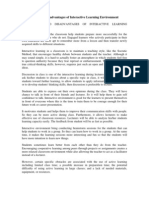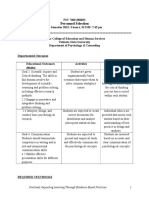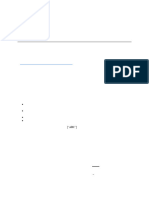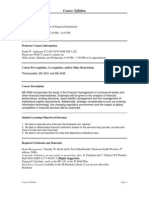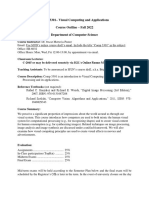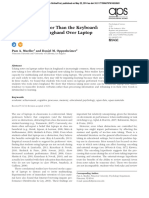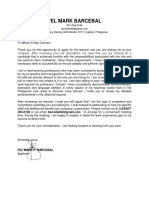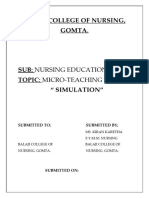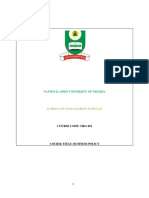Syllabus - FIRE 626 - Spring 2012
Syllabus - FIRE 626 - Spring 2012
Uploaded by
blitzkreeigjayCopyright:
Available Formats
Syllabus - FIRE 626 - Spring 2012
Syllabus - FIRE 626 - Spring 2012
Uploaded by
blitzkreeigjayOriginal Title
Copyright
Available Formats
Share this document
Did you find this document useful?
Is this content inappropriate?
Copyright:
Available Formats
Syllabus - FIRE 626 - Spring 2012
Syllabus - FIRE 626 - Spring 2012
Uploaded by
blitzkreeigjayCopyright:
Available Formats
FIRE 626, Risk Management CRN 24362, Section 901 T 7:00 pm 9:40 pm, Room B1134 Snead Hall
l VCU School of Business Mission The mission of the VCU School of Business is to prepare students for successful careers and lifelong learning by providing management education firmly grounded in technology, interdisciplinary teamwork and global perspectives. Essential to achieving this mission is striving to excel in teaching and scholarly research, and to build effective, value-based relationships with the external community.
Course: FIRE 626, Spring 2012 Instructor Name: Puneet Prakash, Ph.D. Contact Information: Room B4165, Snead Hall, School of Business Phone: (804)-828-7180 Email: pprakash@vcu.edu Faculty Office Hours: 2:00 pm 4:30 pm, Tuesdays and Wednesdays
Bulletin description of FIRE 626: Property and liability risks faced by businesses and public institutions are studied. Insurance and alternative methods of controlling and financing these risks are analyzed and compared.
Teaching method and course emphasis: The course will be mostly based on lectures, case discussions, and presentations. Apart from in class learning, away from class learning will be encouraged through assignments and practice problems. The course is titled Risk Management, and the emphasis is to apply the risk management techniques to a broad array of risks faced by corporations, including property and liability risks. Again, the course will discuss issues and concepts involved in hedging/managing risks in general of which insurance is only a part. The course is quantitative in nature, and will emphasize measurement of risks and application of risk management techniques to various situations involving uncertainty.
Fire 626, Spring 2012
Power point slides if used for lectures will be provided to students. But students should recognize the slides are mnemonics for the instructor, and in no way substitute for lecture notes and text material. Hence students are STRONGLY ADVISED to take class notes.
Student learning outcomes: The course is designed to achieve the following student learning outcomes: An ability to analyze risks faced by a corporation, especially financial corporations An ability to define risk management and measure risks corporations face An ability to apply mathematical principles of decision making under uncertainty An ability to use different risk management tools and products An ability to program quantitative risk models in EXCEL
There is no single text which will cover the entire material for the course. Students are free to use any text that they find suitable. Notes, and supplementary material for the topics covered will be provided. In the past, however, the following text was used.
Text used in the past Risk Management and Financial Institutions, 2nd Ed. Pearson -Prentice Hall, NJ. ISBN 0-13-610295-6: by John C. Hull. Both, lectures and supplementary material are used to create the exams, so class attendance and participation is important. Additional materials may be assigned as needed. EXCEL The course will be based on spreadsheet programming (NOT VBA). In particular, students are to ensure that they have access to add-ins SOLVER and ANALYSIS TOOLPAK. CHECK BLACKBOARD AND YOUR VCU EMAIL REGULARLY. YOU ARE DEEMED TO BE INFORMED ONCE EMAIL IS SENT TO YOUR VCU ID. UPLOADED ON BLACKBOARD. MOST MATERIAL WILL BE
Exams and grading policy: There will be one final exam worth 20% of your grade. There will be at least eight EXCEL assignments and will form the remaining 80% of the grade. If the total number of assignments handed out exceeds eight, one or two assignments with the lowest grade/s may be dropped. No make-up exams will be given nor deadlines extended for assignments. Failure to turn in any one, exams or assignments, will result in a grade of 0. Details will be forthcoming regarding homework. These assignments are designed to provide you with a chance to put the concepts introduced in the class into practice.
Fire 626, Spring 2012
Remember this is a skills based learning course. ALL ASSIGNMENTS AND EXAMS WILL BE EXCEL BASED. DO NOT WAIT UNTIL THE LAST DAY TO BEGIN YOUR HOMEWORK/EXAM. EXPERIENCE HAS SHOWN THAT IN ALL LIKELIHOOD YOU WILL NOT BE ABLE TO FINISH THE ASSIGNED WORK IF YOU BEGIN LATE. Cell phone: Cell phone, pagers, mobile devices, PDAs, MP3 players are to be turned off during class. The use of phones during class is strictly prohibited. Food and drink: No food inside the classroom. Not even energy bars. Only a water bottle is permitted (No other beverages). Blackboard: The Blackboard system shall be used to upload material and for communication purposes. Important dates: The following calendar is to remind students of the important dates. Jan 17 Classes begin. Jan 17 to Jan 23 - add or drop period, late registration. Jan 27 Deadline for students to provide advance written notification to instructors of intent to observe religious holidays. Mar 11 to 18 Spring break. Mar 23 - Last day to withdraw from class with a mark of W. May 1 (5) - last day of class (evening classes). Final Exam Check VCU calendar for date and time. Attendance policy: Although I will not take attendance, class attendance and participation is expected, and has been proven as a prerequisite for doing well. Students are expected be prepared for class and able to contribute to the class discussion. Students may be called on at random to offer their views. Outline of Topics and Course Schedule Because of unforeseen circumstances and responsibilities it is possible the instructor will not be able to meet the scheduled class period. In case this event occurs, barring an emergency, the class will be notified and the class period will be rescheduled or canceled. So, be advised that the following class schedule is tentative and subject to alteration as dictated by the pace, ability and interest of the students. In class discussions, material difficulty and external forces may also dictate alterations. SCHEDULE of TOPICS (subject to change) 1. Jan 17 Discussion of Syllabus. Introduction to the concept of Risk Management in general, and Financial Risk Management in
particular. Different financial institutions, their financial statements and risks facing
Fire 626, Spring 2012
them.
2. Jan 24
Review of portfolio theory and derivatives. Managing the risk of a portfolio of derivative contracts.
3. Jan 31
Overview of probability and statistics used in risk management and insurance. Data analysis/ Fitting a distribution to data. MoM and likelihood estimators
4. Feb 7
Interest rate risk: Relevance to banks and insurance companies.
5. Feb 14
Modeling interest rate risk. Binomial tree, Vasicek and CIR models.
6. Feb 21
Introduction
to
value
at
risk
and
application to hedge funds 7. Feb 28 Building value at risk models and back testing them. Application to Basel II norms. 8. Mar 6 Credit risk default probability and credit spreads 9.Mar 13 10. Mar 20 Spring break. No class Credit value at risk using credit migration matrices 11. Mar 27 Operational risk application of actuarial methods in finance. Frequency-severity analysis. 12. Apr 3 13. Apr 10 14. Apr 17 15. Apr 24 16. May 01 17. May 08 Volatility modeling using GARCH (1, 1). Valuation of CDOs. Liquidity Risk. ERM case studies UGG and Hydro One. Catch-up and review Final Exam
Fire 626, Spring 2012
Other Resources Campus Emergency information What to Know and Do To Be Prepared for Emergencies at VCU: Sign up to receive VCU text messaging alerts (http://www.vcu.edu/alert/notify). Keep your information up-to-date. Within the classroom, the professor will keep her phone on to receive any emergency transmissions. Know the safe evacuation route from each of your classrooms. Emergency evacuation routes are posted in on-campus classrooms. Listen for and follow instructions from VCU or other designated authorities. Within the classroom, follow your professors instructions. Know where to go for additional emergency information (http://www.vcu.edu/alert). Know the emergency phone number for the VCU Police (828-1234). Report suspicious activities and objects.
Inclement Weather Policy The safety of faculty, staff, and students is the principal consideration when decisions are made to open or close VCU during periods of inclement weather. In order to get up-to-date information about weather conditions and their effect on VCU classes, you may: a) listen to local radio stations, b) watch local television stations, c) call the VCU Inclement Weather hotline at (804)828-OPEN, or d) check the VCU website at http://www.vcu.edu/alert/ .
Official Class Cancellation In the event that the University officially cancels classes for inclement weather or other reasons, the class activity (homework, test, etc.) scheduled for the canceled date is automatically rescheduled for the next date that class is officially in session.
VCU Honor System: Plagiarism and Academic Integrity The VCU honor system policy describes the responsibilities of students, faculty, and administration in upholding academic integrity, while at the same time respecting the rights of individuals to the due process offered by administrative hearings and appeals. According to his policy, members of the academic community are required to conduct themselves in accordance with the highest standards of academic honesty and integrity. In addition, All members of the VCU community are presumed to have an understanding of the VCU Honor System and are required to:
Fire 626, Spring 2012
Agree to be bound by the Honor System policy and its procedures; Report suspicion or knowledge of possible violations of the Honor System; Support an environment that reflects a commitment to academic integrity; Answer truthfully when called upon to do so regarding Honor System cases, and, Maintain confidentiality regarding specific information in Honor System cases.
Most importantly, All VCU students are presumed upon enrollment to have acquainted themselves with and have an understanding of the Honor System. (The VCU INSIDER, VCU Honor System 131-132).
The
Honor
System
in
its
entirety
can
be
reviewed
on
the
Web
at
http://www.provost.vcu.edu/pdfs/Honor_system_policy.pdf or it can be found in the VCU Insider at http://www.students.vcu.edu/insider.html.
In this class, because coursework will be collaborative at times, particular issues of integrity arise. You should not copy or print another students work without permission. Any material (this includes IDEAS and LANGUAGE) from another source must be credited, whether that material is quoted directly, summarized, or paraphrased. In other words, you should respect the work of others and in no way present it as their own.
Students with Disabilities SECTION 504 of the Rehabilitation Act of 1973 and the Americans with Disabilities Act of 1990 require that VCU provide an academic adjustment and/or a reasonable accommodation to any individual who advises us of a physical and/or mental disability. To receive accommodations, students must declare their need for disability-related accommodations with the Disability Support Services Office (DSS). The DSS office is located in the Student Commons, Room 102. The office phone number is 828-2253. The Director of Disability Support Services is Joyce Knight. More information is available at the Disability Support Services webpage: http://www.students.vcu.edu/dss/.
If you have a physical or mental impairment that requires an academic adjustment or accommodation, arrange a meeting with me at your earliest convenience. Additionally, if your coursework requires you to work in a lab environment, you should advise me or department chairperson of any concerns you may have regarding safety issues related to your limitation(s). This statement applies not only to this course but also to every other course in this University.
Fire 626, Spring 2012
Student Conduct in the Classroom According to the VCU Resource Guide, The instructional program at VCU is based upon the premise that students enrolled in a class are entitled to receive instruction free from interference by other students. Accordingly, in classrooms, laboratories, studies, and other learning areas, students are expected to conduct themselves in an orderly and cooperative manner so that the faculty member can proceed with their [sic] customary instruction. Faculty members (including graduate teaching assistants) may set reasonable standards for classroom behavior in order to serve these objectives. If a student believes that the behavior of another student is disruptive, the instructor should be informed. Among other things, cell phones and beepers should be turned off while in the classroom. Also, the University Rules and Procedures prohibit anyone from having in his possession any firearm, other weapon, or explosive, regardless of whether a license to possess the same has been issued, without the written authorization of the President of the university..." See http://www.students.vcu.edu/rg/policies/rg7conductguide.html and the VCU Resource Guide for more information: http://www.students.vcu.edu/insider.html.
Certainly the expectation in this course is that students will attend class with punctuality, proper decorum, required course material, and studious involvement.
The VCU Resource Guide contains additional important information about a number of other policies with which students should be familiar, including Guidelines on Prohibition of Sexual Harassment, Grade Review Procedure, and Ethics Policy on Computing. It also contains maps, phone numbers, and information about resources available to VCU students. The VCU Resource Guide is available online at the link above or through the Division of Student Affairs.
VCU Mobile The VCU Mobile application is a valuable tool to get the latest VCU information on the go. The application contains helpful information including the VCU directory, events, course schedules, campus maps, athletics and general VCU news, emergency information, library resources, Blackboard and more. To download the application on your smart phone or for more information, please visit http://m.vcu.edu/http://m.vcu.edu/.
Fire 626, Spring 2012
Religious Observances Students desiring to observe religious holiday of special importance must provide advance written notification to the instructor by the end of the second week of classes.
Email Policy Electronic mail or "email" is considered an official method for communication at VCU because it delivers information in a convenient, timely, cost effective, and environmentally aware manner. This policy ensures that all students have access to this important form of communication. It ensures students can be reached through a standardized channel by faculty and other staff of the University as needed. Mail sent to the VCU email address may include notification of University-related actions, including disciplinary action. Please read the policy in its entirety: http://www.ts.vcu.edu/kb/3407.html.
Statement on Military Short-Term Training or Deployment Military students may receive orders for short-term training or deployment. These students are asked to inform and present their orders to their professor(s). For further information on policies and procedures contact Military Services at 828-5993 or access the corresponding policies at and
http://www.pubapps.vcu.edu/bulletins/about/?Default.aspx?uid=10096&iid=30704 http://www.pubapps.vcu.edu/BULLETINS/undergraduate/?uid=10096&iid=30773.
Computer ethics: http://www.ts.vcu.edu/kb/3409.html Please contact the instructor or Deans office for further information or concerns. Sexual harassment: http://www.vcu.edu/eeoaa/pdfs/sexualharassment.pdf Please contact the instructor or Deans office for further information or concerns.
Fire 626, Spring 2012
You might also like
- Advantages & Disadvantages of Interactive Learning90% (10)Advantages & Disadvantages of Interactive Learning2 pages
- Faculty of Education Graduate Studies ProgramNo ratings yetFaculty of Education Graduate Studies Program4 pages
- Course Syllabus PE 408: To Sport Education. Champaign, IL: Human KineticsNo ratings yetCourse Syllabus PE 408: To Sport Education. Champaign, IL: Human Kinetics5 pages
- UT Dallas Syllabus For Ba4349.501.07s Taught by Frank Anderson (Fwa012000)No ratings yetUT Dallas Syllabus For Ba4349.501.07s Taught by Frank Anderson (Fwa012000)6 pages
- Investment and Portfolio Management: Dana KikuNo ratings yetInvestment and Portfolio Management: Dana Kiku3 pages
- ECON 1P92 Course Outline Fall 2022 Section1No ratings yetECON 1P92 Course Outline Fall 2022 Section16 pages
- BUS173.10 Course Outline Spring 2024 ZkH3No ratings yetBUS173.10 Course Outline Spring 2024 ZkH34 pages
- UT Dallas Syllabus For Eco2301.002.07s Taught by Iyabo Ajiboye (Iaa021000)No ratings yetUT Dallas Syllabus For Eco2301.002.07s Taught by Iyabo Ajiboye (Iaa021000)5 pages
- Risk and Financial Institutions ECONOMICS 2191A-001: RegistrationNo ratings yetRisk and Financial Institutions ECONOMICS 2191A-001: Registration6 pages
- SED 529: Creative and Comprehensive Assessment of Secondary Students Section: 41E Course Syllabus: Summer INo ratings yetSED 529: Creative and Comprehensive Assessment of Secondary Students Section: 41E Course Syllabus: Summer I6 pages
- UT Dallas Syllabus For Fin6350.5u1.10u Taught by Carolyn Reichert (Carolyn)No ratings yetUT Dallas Syllabus For Fin6350.5u1.10u Taught by Carolyn Reichert (Carolyn)6 pages
- Instructor's Contact Information: Polkovn@utdallas - EduNo ratings yetInstructor's Contact Information: Polkovn@utdallas - Edu5 pages
- Syllabus_ACCT430_2024_Rickmann_2024_09_22No ratings yetSyllabus_ACCT430_2024_Rickmann_2024_09_226 pages
- Investing in People Cascio Boudreau 2nd Edition0% (1)Investing in People Cascio Boudreau 2nd Edition3 pages
- FBE 421: Financial Analysis and Valuation Spring 2013No ratings yetFBE 421: Financial Analysis and Valuation Spring 20135 pages
- UT Dallas Syllabus For Opre6335.001.08s Taught by Alain Bensoussan (Axb046100)No ratings yetUT Dallas Syllabus For Opre6335.001.08s Taught by Alain Bensoussan (Axb046100)5 pages
- Class Hours Class Room Instructor: Office Hours: Office: E-MailNo ratings yetClass Hours Class Room Instructor: Office Hours: Office: E-Mail5 pages
- ACTL5101 Probability and Statistics For Actuaries S12013No ratings yetACTL5101 Probability and Statistics For Actuaries S1201317 pages
- The Pen Is Mightier Than The Keyboard: Advantages of Longhand Over Laptop Note TakingNo ratings yetThe Pen Is Mightier Than The Keyboard: Advantages of Longhand Over Laptop Note Taking10 pages
- Modern Retro Science Experiment Educational PresentationNo ratings yetModern Retro Science Experiment Educational Presentation12 pages
- Fel Mark Barcebal: 927-294-6166 Mahabang Dahilig, BATANGAS CITY (Capital), PhilippinesNo ratings yetFel Mark Barcebal: 927-294-6166 Mahabang Dahilig, BATANGAS CITY (Capital), Philippines5 pages
- Classroom Observation Assignment-Form 2 BlankNo ratings yetClassroom Observation Assignment-Form 2 Blank2 pages
- 1 Classroom Observation Assignment-Form 1 Instructional Project 4No ratings yet1 Classroom Observation Assignment-Form 1 Instructional Project 43 pages
- Course Syllabus and Curricular Guide: Perpetual Help College Manila BAM2209 College of BusinessNo ratings yetCourse Syllabus and Curricular Guide: Perpetual Help College Manila BAM2209 College of Business7 pages
- Coronavirus (Covid-19) : This Presentation Subtitle Can Be EditedNo ratings yetCoronavirus (Covid-19) : This Presentation Subtitle Can Be Edited16 pages
- Handbook: ACC9011M Finance and Accounting 2022-23, Term 2 (Feb Cohort)No ratings yetHandbook: ACC9011M Finance and Accounting 2022-23, Term 2 (Feb Cohort)20 pages
- Collapsed Structure Search and Rescue Instructors Workshop (CSSRIW) CourseNo ratings yetCollapsed Structure Search and Rescue Instructors Workshop (CSSRIW) Course1 page
- Science, Technology, and Nation BuildingNo ratings yetScience, Technology, and Nation Building9 pages
- To Book An Office Hour Meeting: Https://gordonchalmers - Youcanbook.meNo ratings yetTo Book An Office Hour Meeting: Https://gordonchalmers - Youcanbook.me3 pages
- Advantages & Disadvantages of Interactive LearningAdvantages & Disadvantages of Interactive Learning
- Course Syllabus PE 408: To Sport Education. Champaign, IL: Human KineticsCourse Syllabus PE 408: To Sport Education. Champaign, IL: Human Kinetics
- UT Dallas Syllabus For Ba4349.501.07s Taught by Frank Anderson (Fwa012000)UT Dallas Syllabus For Ba4349.501.07s Taught by Frank Anderson (Fwa012000)
- UT Dallas Syllabus For Eco2301.002.07s Taught by Iyabo Ajiboye (Iaa021000)UT Dallas Syllabus For Eco2301.002.07s Taught by Iyabo Ajiboye (Iaa021000)
- Risk and Financial Institutions ECONOMICS 2191A-001: RegistrationRisk and Financial Institutions ECONOMICS 2191A-001: Registration
- SED 529: Creative and Comprehensive Assessment of Secondary Students Section: 41E Course Syllabus: Summer ISED 529: Creative and Comprehensive Assessment of Secondary Students Section: 41E Course Syllabus: Summer I
- UT Dallas Syllabus For Fin6350.5u1.10u Taught by Carolyn Reichert (Carolyn)UT Dallas Syllabus For Fin6350.5u1.10u Taught by Carolyn Reichert (Carolyn)
- Instructor's Contact Information: Polkovn@utdallas - EduInstructor's Contact Information: Polkovn@utdallas - Edu
- FBE 421: Financial Analysis and Valuation Spring 2013FBE 421: Financial Analysis and Valuation Spring 2013
- UT Dallas Syllabus For Opre6335.001.08s Taught by Alain Bensoussan (Axb046100)UT Dallas Syllabus For Opre6335.001.08s Taught by Alain Bensoussan (Axb046100)
- Class Hours Class Room Instructor: Office Hours: Office: E-MailClass Hours Class Room Instructor: Office Hours: Office: E-Mail
- ACTL5101 Probability and Statistics For Actuaries S12013ACTL5101 Probability and Statistics For Actuaries S12013
- The Pen Is Mightier Than The Keyboard: Advantages of Longhand Over Laptop Note TakingThe Pen Is Mightier Than The Keyboard: Advantages of Longhand Over Laptop Note Taking
- Modern Retro Science Experiment Educational PresentationModern Retro Science Experiment Educational Presentation
- Fel Mark Barcebal: 927-294-6166 Mahabang Dahilig, BATANGAS CITY (Capital), PhilippinesFel Mark Barcebal: 927-294-6166 Mahabang Dahilig, BATANGAS CITY (Capital), Philippines
- 1 Classroom Observation Assignment-Form 1 Instructional Project 41 Classroom Observation Assignment-Form 1 Instructional Project 4
- Course Syllabus and Curricular Guide: Perpetual Help College Manila BAM2209 College of BusinessCourse Syllabus and Curricular Guide: Perpetual Help College Manila BAM2209 College of Business
- Coronavirus (Covid-19) : This Presentation Subtitle Can Be EditedCoronavirus (Covid-19) : This Presentation Subtitle Can Be Edited
- Handbook: ACC9011M Finance and Accounting 2022-23, Term 2 (Feb Cohort)Handbook: ACC9011M Finance and Accounting 2022-23, Term 2 (Feb Cohort)
- Collapsed Structure Search and Rescue Instructors Workshop (CSSRIW) CourseCollapsed Structure Search and Rescue Instructors Workshop (CSSRIW) Course
- To Book An Office Hour Meeting: Https://gordonchalmers - Youcanbook.meTo Book An Office Hour Meeting: Https://gordonchalmers - Youcanbook.me


